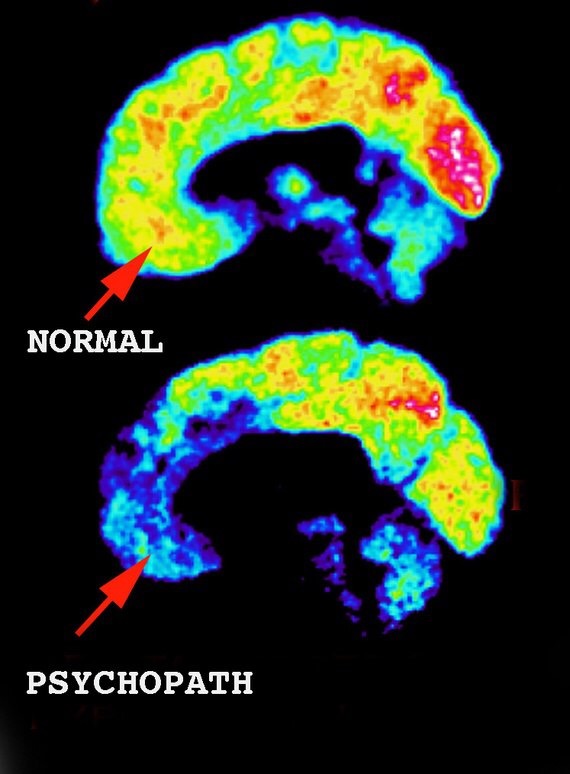How Brain Changes Turn People Into Dangerous Psychopaths
Sometimes, shameless and cruel behavior isn’t a personal choice. Ruthless, narcissistic manipulators—psychopaths—capture the public’s imagination and frequently appear in popular culture. People are fascinated by psychopaths, but in real life, it’s best to keep your distance. They are impulsive, incapable of empathy, and feel no guilt. A psychopath will use you without remorse and, even when caught lying or betraying you, won’t give their actions a second thought.
So why do most people feel guilt, while psychopaths lack this ability? Research shows the reason isn’t poor upbringing, but rather structural and functional abnormalities in the brain.
What’s Wrong With the Psychopath’s Brain?
Empathy, guilt, and moral judgment are born in the ventromedial prefrontal cortex (vmPFC). Studies of people with bilateral damage to this area have shown that it is crucial for emotionally experiencing complex moral situations. Participants with vmPFC damage always relied solely on logic, even in difficult scenarios like having to kill someone with their own hands to prevent a greater evil.
When scientists at the University of Wisconsin–Madison studied the brains of criminal psychopaths, they found dysfunction specifically in this structure, particularly in its connections with the brain’s emotional center—the amygdala.
Another study of criminals showed that violent psychopaths have significantly reduced gray matter volume in the anterior rostral prefrontal cortex and the temporal pole. These structures are also responsible for empathy and guilt—feelings unfamiliar to psychopaths.
However, the inability to empathize isn’t a crime, and a person with such an anomaly won’t necessarily become a killer, fraudster, or rapist. In fact, there are psychopaths among respected members of society: scientists and CEOs of major corporations.
Other complex combinations of neurological activity are responsible for the antisocial behavior of psychopaths.
What Turns a Psychopath Into a Criminal?
In 2013, scientists conducted another study in a prison. Inmates were shown images depicting physical pain and then asked to imagine that this was happening to themselves or to others.
When psychopaths imagined their own pain, activity increased in the brain areas responsible for pain empathy: the anterior insula, the middle part of the cingulate cortex, the somatosensory cortex, and the right amygdala. It was clear that psychopaths understand and feel the concept of pain—when it concerns themselves.
But when asked to imagine others in pain, their brain activity was very different. This time, the areas responsible for empathy for pain were not activated. Instead, activity increased in the ventral striatum—a brain structure that controls reward and motivation processes.
Researchers suggested that psychopaths may actually enjoy seeing others in pain.
However, even this isn’t enough for someone to commit violence and risk going to prison. To commit a crime, a psychopath must either want it badly enough and be unable to control their behavior, or have a poor understanding of the consequences of their actions. This is exactly what further experiments revealed.
How Anticipation of Reward Overpowers Self-Control
The striatum is an important part of the brain’s reward system. It’s involved in generating motivation to act when we want something. However, we usually won’t pursue what we want if it leads to bad consequences.
We can thank the prefrontal cortex for this ability: it helps control our actions and suppress impulsive behavior. Thanks to the prefrontal cortex, a person can assess the consequences of a decision and refuse what they desire.
In psychopaths, this mechanism works much worse than in normal people. In criminals with a high degree of psychopathy, the connections between the ventral striatum and the prefrontal cortex are disrupted.
Dangerous psychopaths anticipate rewards so strongly that they can’t control their behavior. Their desires are too powerful for the prefrontal cortex to handle.
Moreover, due to the weakened connection between the prefrontal cortex and the striatum, they are unable to realize the consequences of their actions. Immediate reward overshadows their consciousness, and future consequences like imprisonment don’t matter at all.
Does This Mean Psychopaths Aren’t Responsible?
American judges tend to give more lenient sentences when there is a biochemical cause for psychopathy. In such cases, it seems the person bears less personal responsibility for their actions. However, this is little comfort to the victims of a psychopath and their future victims.
In Russia, the term “psychopathy” is not used. In the International Classification of Diseases, this disorder is listed as F60.2—dissocial personality disorder—and currently has no effective treatment methods.
Probably the only thing you can do is recognize a psychopath in time and keep your distance.



